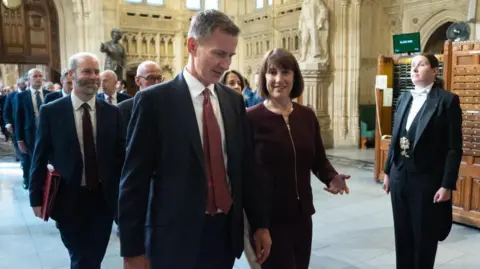Politics to roar back in blame game over funding

 Getty Images
Getty ImagesFor the first time since the general election, party politics will come roaring back at Westminster on Monday.
Yes, there was a bit of it at the State Opening of Parliament a few weeks back, but ceremony and civility took centre stage then really.
I don’t expect much of either later.
When the chancellor gets to her feet in the House of Commons this afternoon, she will claim a whole graveyard’s worth of political skeletons have been crashing out of every cupboard in Whitehall since Labour won the election.
For Rachel Reeves, it won’t be “things can only get better” as Labour’s victory anthem in 1997 claimed, but “it turns out things are a whole lot worse” or words to that effect.
There are two big questions: the extent to which this claim is believable and why the government is doing this now.
Firstly, that question of believability.
Paul Johnson, the director of the highly respected Institute for Fiscal Studies (IFS), told the BBC: “I don’t think it’s really very credible at all.”
The basis for this argument is that so much about the public finances is, well, public: there was a Budget in March, and alongside it, the Office for Budget Responsibility’s economic and fiscal outlook.
Nonetheless, the argument we will hear from Rachel Reeves, in a Commons statement, a 30-odd page accompanying document and in a news conference at the Treasury, will be something like this: “We blame the other lot.”
They reckon by the time they are done, on Monday evening, the IFS and others will be acknowledging the numbers are different from what was previously publicly known.
Central to their argument will be the scale of what are known as “in-year costs” that were not accounted for in the documents back in the spring.
Senior Conservatives I speak to say this isn’t credible just a few months into the financial year and beyond that governing is about choices: it is up to Labour now to decide what it wants to do.
You get a sense of how Labour will counter this, in a thread on X from former Treasury adviser and Labour peer Lord Wood.
In essence, he argues, you have to be in government to know of any gaps between what it is estimated a project will cost, and the actual bill.
This will be the argument made to justify cancelling various rail, road and hospital building projects which ministers will claim there wasn’t and isn’t the money for.
We also expect the government to accept the pay increases above inflation for teachers and many NHS staff recommended by the independent pay review bodies for those sectors.
This, ministers will argue, is both the right thing to do and will, they hope, mean no more strikes.
But it is a choice and an expensive one – and not one that can be blamed on the previous government.
Why is government doing this now?
Expect to see Jeremy Hunt, now the shadow chancellor, argue robustly that he himself took plenty of difficult decisions to ensure the economic picture would be considerably better now than it was, as his opponent claims her inheritance is dire.
Of course, both of these things can be true at the same time.
So, why is the government doing this now?
This is where we get to its broader strategy, which they are chunking up into three parts, across the next five years – in the countdown to the next general election.
The first element of this is what they will call “fixing the foundations”.
Expect to hear no end of references to this in the coming weeks and months. This is where they will bang on about how grim things are while the Tories are busy arguing among themselves about who should replace Rishi Sunak.
‘Fixing the foundations’
The aim then, in stage two, is a sense of “rebuilding Britain” – and they mean that literally, ie building stuff, particularly homes. Lots more homes, which might be easier said than done. They will be saying more about that on Tuesday.
And the third element is people feeling better off – and they have their fingers crossed that this will be a real sentiment, not just a hope and a slogan, as the next election nears. Let’s see.
But back to “fixing the foundations”. Monday is day one of this, and is also about laying some political foundations for tax rises expected in the autumn.
We’ll also find out the date of the Budget.
It is widely expected in October and almost as widely expected are tax rises.
Putting up the main rates of income tax, VAT and national insurance have been ruled out, so instead don’t be surprised if there are, for instance, hikes to capital gains tax and inheritance tax and pension tax relief becomes less generous.
That, though, is for the autumn.
Today will park the political pleasantries of the last few weeks and see a pretty noisy argument about the last government, the new government and what might come next.
Source link




